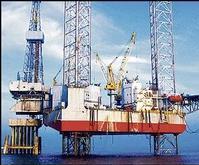Gareth Manning, Gleaner Writer

China National Offshore Oil Corporation's (CNOOC) oil rig in China's Bohai Sea is seen in this September 2, 2003 file photo. China's CNOOC Ltd. on Tuesday abandoned its $18.5 billion offer to acquire Unocal Corp. in the face of strident political opposition, clearing the way for the U.S. oil and gas producer to conclude a deal with larger U.S. rival Chevron Corp. Picture taken September 2.
TEN BLOCKS tendered for oil exploration are to be awarded by year end, said Petroleum Corporation director, Dr. Raymond Wright.
The Government opened up 23 territorial blocks for oil exploration in Houston, Texas last month, and only received bids for ten blocks from three companies in the United States. A block measures 2,500 square kilometres.
When the Petroleum Corporation of Jamaica (PCJ) received the three applications for licences for oil and gas exploration at the June 15 deadline, Dr. Wright had stated that the award of licences would be made in three months "or so." He said then that there had been some overlapping in the blocks applied for.
Director of the Energy Division in the Ministry of Technology, Conroy Watson, told the Financial Gleaner that the ministry is still unable to say when the blocks will be awarded. "These things take time. They have to go through particular processes before they are awarded," he says.
Group Managing Director of the Petroleum Corporation of Jamaica Dr. Raymond Wright, says the process may take up to three months.
"We haven't even opened up for negotiations yet. These things can take three weeks or they can take up to three months," he says.
Companies did not respond to all bids last month.
Speaking to the Trinidad Guardian last month, Minister Paulwell noted that the Government did not expect to get bids for the all the blocks.
"When we first made the presentation in Houston, many of the major companies told us that while they were interested, they were unhappy with the terms of the production-sharing contract (PSC)."
In a lecture delivered at the University of the West Indies last month, Dr. Wright noted that companies would have to bear exploration costs, but would be reimbursed through a cost recovery process. The arrangement would see royalties being paid to Government for oil and gas produced.
The highest payable royalty stands at 12 and a half percent. This is expected to decrease as companies explore in deeper waters. Dr. Wright pointed out that a negotiable sum from exploration would be invested each year to train Jamaicans in respect of the energy industry. This he said should benefit mainly tertiary students at the post-graduate level. He also said two and a half per cent of profits should be placed in a fund for social and environmental projects. Under Government gas policy, gas produced would go towards satisfying domestic power generation needs, while excess gas would be exported.










